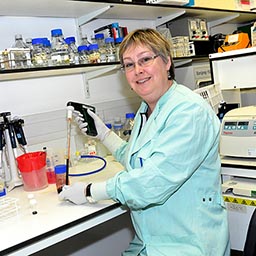Dr Caroline Griffiths
BSc, PhD
Programme Lead: Biomedical and Biological Sciences
School of Biological and Medical Sciences

Role
The Biomedical and Biological Sciences Programme offers a suite of 4 high-quality, research-led science degrees (BSc Honours) that complement each other in their focus on human health, disease and healthcare. The degrees provide excellent learning, training and development opportunities for students. Graduates reach high academic and personal achievement goals, show strong competitiveness in the job market and reflect robust student satisfaction.
My role encompasses the management and continued development of the programme. I work with a strong team of lecturers who are keen to enthuse our students about the fundamentals of science and about what interests them in their research areas. I also aim link our curriculum and our students with the outlook from key stakeholders, including future employers (such as Brookes and other universities, the NHS, and healthcare / pharmaceutical industries), and relevant policy-making and professional bodies (such as the HEA, QAA, IBMS, etc).
I like to keep good contact with the students, and I am involved in teaching at all levels, including lecturing, practicals, tutorials, personal tutoring and, as a major teaching role I co-ordinate and support research projects and work placements.
Teaching and supervision
Modules taught
- P44621 Dissertation for Infection Prevention & Control
- U14533 Microbiology
- U14565 Industrial Experience
- U14665 Biomedical Laboratory Placement
- U14690 Interdisciplinary Project
- U14699 Project.
- BSc and MSc teaching, with focus on molecular biology, virology.
- Lead tutor for Projects (UG and PG) and Placements (UG).
Supervision
PhD supervision (joint) by research and by published work.
Research
My research interests include the biology of baculoviruses and their application as protein expression tools. These insect-specific viruses are harmless to humans but readily support the expression of significant amounts of proteins in laboratory cultures and in their natural caterpillar hosts. The virus has been developed for this application primarily as a result of two very strong promoters, regulating the viral polyhedrin and p10 genes, but whilst the role of the polyhedrin protein is well established, that of the p10 protein remains obscure. Knock-out and recombinant viruses are beginning to allow us to evaluate biological characteristics, and formulate possible funtions for this non-essential protein.
The use of the virus as a protein expression tool has grown over the past 30 years, but there are still a number of issues that plague users, and that prevent it being a usinversal system suitable for all appliations. Aspects of my research seek to address some of these issues, with a view to enhancing the expression system.
Research group membership
- Insect Virology Research Group (led by Professor Linda King)
Research projects
- Baculovirus expression vector system utilisation and development.
Publications
Professional information
Memberships of professional bodies
- American Society of Virology
- Microbiology Society
- Institute of Biomedical Science (Fellow)
- Royal Society of Medicine (Associate)
Further details
Other experience
- Post-doctoral research scientist (1995-2001) - Centre for Ecology and Hydrology (formerly the Institute of Virology & Environmental Microbiology), Oxford.
- Research Scientist (1991-1995) - Wellcome Research Laboratories, Langley Court, Beckenham
- Clinical Research Scientist (1990-1991) - Centre for Applied Microbiology and Research, Porton Down, Salisbury
